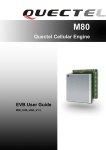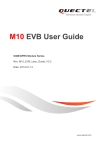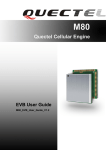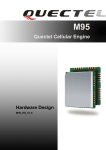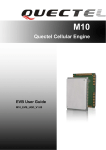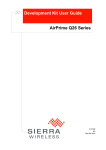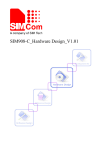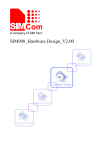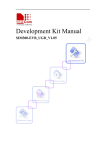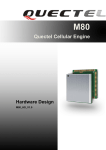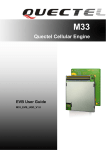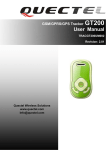Download Sim2 M80 User guide
Transcript
EVB User Guide M80 Quectel Cellular Engine EVB User Guide M80_EVB_UGD_V1.0 M80_EVB_UGD_V1.0 0 EVB User Guide Document Title M80 EVB User Guide Version 1.0 Date 2011-12-13 Status Released Document Control ID M80_EVB_UGD_V1.0 l e t l c a i e t u n Q fide n o C General Notes Quectel offers this information as a service to its customers, to support application and engineering efforts that use the products designed by Quectel. The information provided is based upon requirements specifically provided for customers of Quectel. Quectel has not undertaken any independent search for additional information, relevant to any information that may be in the customer’s possession. Furthermore, system validation of this product designed by Quectel within a larger electronic system remains the responsibility of the customer or the customer’s system integrator. All specifications supplied herein are subject to change. Copyright This document contains proprietary technical information of Quectel Co., Ltd. Copying this document, distribution to others, and communication of the contents thereof, are forbidden without permission. Offenders are liable to the payment of damages. All rights are reserved in the event of a patent grant or registration of a utility model or design. All specifications supplied herein are subject to change without notice at any time. Copyright © Quectel Wireless Solutions Co., Ltd. 2011 M80_EVB_UGD_V1.0 1 EVB User Guide Contents Contents ............................................................................................................................................ 2 Table Index........................................................................................................................................ 3 Figure Index ...................................................................................................................................... 4 0. Revision history ............................................................................................................................ 5 1. Introduction ................................................................................................................................... 6 1.1. Related documents .............................................................................................................. 6 1.2. Safety precautions ............................................................................................................... 6 2. EVB kit introduction ..................................................................................................................... 8 2.1. EVB top and bottom view ................................................................................................... 8 2.2. EVB accessories ................................................................................................................ 11 3. Interface application.................................................................................................................... 12 3.1. Power interface.................................................................................................................. 12 3.2. Audio interface .................................................................................................................. 13 3.3. Loud speaker ..................................................................................................................... 14 3.4. SIM card interface ............................................................................................................. 15 3.4.1 SIM1 card interface .................................................................................................. 15 3.4.2 SIM2 card interface .................................................................................................. 16 3.5. Antenna interface .............................................................................................................. 17 3.6. Serial port and debug port ................................................................................................. 17 3.7. Switches and buttons ......................................................................................................... 19 3.8. Operating status LED ........................................................................................................ 20 3.9. USB interface .................................................................................................................... 21 3.10. Test points ....................................................................................................................... 22 3.10.1 CON101.................................................................................................................. 23 3.10.2 CON102.................................................................................................................. 23 3.10.3 CON103.................................................................................................................. 24 3.10.4 CON104.................................................................................................................. 25 3.10.5 CON105.................................................................................................................. 26 4. EVB accessories assembly .......................................................................................................... 27 5. Illustration ................................................................................................................................... 28 5.1. Power on............................................................................................................................ 28 5.2. Communicate with the module.......................................................................................... 28 5.3. Firmware upgrade through main UART............................................................................ 28 5.4. Turn off.............................................................................................................................. 29 5.5. Emergency off ................................................................................................................... 29 5.6. Auxiliary UART ................................................................................................................ 29 l e t l c a i e t u n Q fide n o C M80_EVB_UGD_V1.0 -2- EVB User Guide Table Index TABLE 1: RELATED DOCUMENTS ..................................................................................................... 6 TABLE 2: PIN OF POWER INTERFACE ............................................................................................ 12 TABLE 3: PINS OF PCM CHANNEL .................................................................................................. 13 TABLE 4: PINS OF AUDIO CHANNEL 2 ........................................................................................... 13 TABLE 5: PINS OF AUDIO CHANNEL 1 ........................................................................................... 14 TABLE 6: PINS OF LOUD SPEAKER ................................................................................................. 14 TABLE 7: PINS OF SIM CARD INTERFACE ..................................................................................... 15 l e t l c a i e t u n Q fide n o C TABLE 8: PINS OF SIM CARD INTERFACE ..................................................................................... 16 TABLE 9: PINS OF DEBUG PORT ...................................................................................................... 17 TABLE 10: PINS OF UART PORT3 ..................................................................................................... 18 TABLE 11: PINS OF SERIAL PORT .................................................................................................... 18 TABLE 12: SWITCHES AND BUTTONS ............................................................................................ 19 TABLE 13: STATUS LEDS ................................................................................................................... 20 TABLE 14: PINS OF SERIAL PORT .................................................................................................... 21 TABLE 15: PINS OF CON101 .............................................................................................................. 23 TABLE 16: PINS OF CON102 .............................................................................................................. 24 TABLE 17: PINS OF CON103 .............................................................................................................. 24 TABLE 18: PINS OF CON104 .............................................................................................................. 25 TABLE 19: PINS OF CON104 .............................................................................................................. 26 M80_EVB_UGD_V1.0 -3- EVB User Guide Figure Index FIGURE 1: EVB TOP VIEW ................................................................................................................... 8 FIGURE 2: EVB BOTTOM VIEW.......................................................................................................... 9 FIGURE 3: INTRODUCTION TO ACCESSORIES ............................................................................. 11 FIGURE 4: POWER INTERFACE ........................................................................................................ 12 FIGURE 5: AUDIO INTERFACE ......................................................................................................... 13 FIGURE 6: LOUD SPEAKER INTERFACE ........................................................................................ 14 FIGURE 7: SIM1 CARD INTERFACE ................................................................................................. 15 l e t l c a i e t u n Q fide n o C FIGURE 8: SIM2 CARD INTERFACE ................................................................................................. 16 FIGURE 9: ANTENNA INTERFACE ................................................................................................... 17 FIGURE 10: AUXILIARY UART AND DEBUG UART ...................................................................... 17 FIGURE 11: MAIN UART .................................................................................................................... 18 FIGURE 12: SWITCHES AND BUTTONS .......................................................................................... 19 FIGURE 13: OPERATING STATUS LED ............................................................................................ 20 FIGURE 14: USB INTERFACE ............................................................................................................ 21 FIGURE 15: TEST POINTS OVERVIEW ............................................................................................ 22 FIGURE 16: CON101 ............................................................................................................................ 23 FIGURE 17: CON102 ............................................................................................................................ 23 FIGURE 18: CON103 ............................................................................................................................ 24 FIGURE 19: CON104 ............................................................................................................................ 25 FIGURE 20: CON105 ............................................................................................................................ 26 FIGURE 21: EVB AND ACCESSORIES EQUIPMENT ...................................................................... 27 FIGURE 22: CONNECTION OF AUXILIARY UART......................................................................... 29 M80_EVB_UGD_V1.0 -4- EVB User Guide 0. Revision history Revision Date Author Description of change 1.0 2011-12-09 Ray Xu Original l e t l c a i e t u n Q fide n o C M80_EVB_UGD_V1.0 -5- EVB User Guide 1. Introduction This document defines and specifies the usage of M80 EVB. Customers can get useful information about M80 EVB from this document. 1.1. Related documents Table 1: Related documents SN [1] [2] [3] [4] [5] l e t l c a i e t u n Q fide n o C Document name Remark M80_ATC AT commands sets GSM_UART_AN The document of serial port application note M80_HD Hardware design GSM_FW_Upgrade_Tool_ Lite_GS2_UDG GSM Firmware upgrade tool lite GS2 ueser guide GSM_DUAL_UART_AN_V1.0 GSM_DUAL_UART application Notes 1.2. Safety precautions The following safety precautions must be observed during all phases of the operation, such as usage, service or repair of any cellular terminal or mobile incorporating M80 module. Manufacturers of the cellular terminal are advised to convey the following safety information to users and operating personnel and to incorporate these guidelines into all manuals supplied with the product. If not so, Quectel does not take on any liability for customer failure to comply with these precautions. When in a hospital or other health care facility, observe the restrictions on the use of mobile. Switch the cellular terminal or mobile off. Medical equipment may be sensitive to RF energy interference. Switch off the cellular terminal or mobile before boarding an aircraft. Make sure it switched off. The operation of wireless appliances in an aircraft is forbidden to prevent interference with communication systems. Forget to think much of these instructions may influence the flight safety or offend against local legal action, or both. Do not operate the cellular terminal or mobile in the presence of flammable gas or fume. Switch off the cellular terminal when you are near petrol station, fuel depot, chemical plant or where blasting operations are in progress. Operation of any electrical equipment in potentially explosive atmosphere can constitute a safety hazard. M80_EVB_UGD_V1.0 -6- EVB User Guide Your cellular terminal or mobile receives and transmits radio frequency energy while switched on. RF interference can occur if it is used close to TV set, radio, computer or other electric equipment. Road safety comes first! Do not use a hand-held cellular terminal or mobile while driving a vehicle, unless it is securely mounted in a holder for hands-free operation. Before making a call with a hand-held terminal or mobile, park the vehicle. l e t l c a i e t u n Q fide n o C GSM cellular terminals or mobiles operate using radio frequency signal and cellular network. Because of this, the connection cannot be guaranteed in all conditions, for example no mobile fee or an invalid SIM card. While you are in this condition and need emergent help, please remember using emergency call. In order to make or receive calls, the cellular terminal or mobile must be switched on and in a service area with adequate cellular signal strength. Some networks do not allow for emergency call if certain network services or phone features are in use (e.g. lock functions, fixed dialing etc.). You may have to deactivate those features before you can make an emergency call. Also, some networks require that a valid SIM card be properly inserted in cellular terminal or mobile. M80_EVB_UGD_V1.0 -7- EVB User Guide 2. EVB kit introduction 2.1. EVB top and bottom view B l e t l c a i e t u n Q fide n o C M N Y K J O I E L H G F A D C Figure 1: EVB top view M80_EVB_UGD_V1.0 -8- EVB User Guide U X T S l e t l c a i e t u n Q fide n o C Z R Q P V W Figure 2: EVB bottom view A: SIM1 card cassette B: Main UART port C: Debug UART port D: Auxiliary UART port M80_EVB_UGD_V1.0 -9- EVB User Guide E: GSM RF connector F: 5V switch G: VCHG switch H: Switch for USB download I: PWRKEY switch J: PWRKEY button K: EMERG_OFF button L: LED indicator M: Camera interface N: GPS module O: M80 module P: SIM2 card cassette Q: USB interface R: PCM audio S: Handset interface of audio channel 1 T: Handset interface of audio channel 2 U: Earphone interface of audio channel 2 X: Analogy camera interface Y: GPS RF connector Z: SD card cassette l e t l c a i e t u n Q fide n o C M80_EVB_UGD_V1.0 - 10 - EVB User Guide 2.2. EVB accessories l e t l c a i e t u n Q fide n o C Figure 3: Introduction to accessories A: USB to UART converter cable B: USB cable C: Earphone D: 5V DC adapter E: Bolts and nuts for fixing module and EVB F: RF cable and Antenna M80_EVB_UGD_V1.0 - 11 - EVB User Guide 3. Interface application 3.1. Power interface l e t l c a i e t u n Q fide n o C GND 1 Figure 4: Power interface Table 2: Pin of power interface Pin 1 Signal I/O Adapter input I M80_EVB_UGD_V1.0 Description 5V/2A DC source input - 12 - EVB User Guide 3.2. Audio interface l e t l c a i e t u n Q fide n o C 3&4 Channel 2 4 3 21 PCM channel 4 3 2 1 Channel 1 4 3 2 1 Channel 2 Figure 5: Audio interface Table 3: Pins of PCM channel Pin 1 2 3 4 Signal I/O Description MIC2N I Negative microphone input SPK2N O Negative receiver output SPK2P O Positive receiver output MIC2P I Positive microphone input Note An earphone or handset can be used in audio channel 2. Table 4: Pins of audio channel 2 Pin 1 2 3 4 Signal I/O MIC2N I AGND Description Note Negative microphone input AGND of audio circuits SPK2P O Positive receiver output MIC2P I Positive microphone input An earphone or handset can be used in audio channel 2. M80_EVB_UGD_V1.0 - 13 - EVB User Guide Table 5: Pins of audio channel 1 Pin Signal I/O Description 1 MIC1N I Negative microphone input 2 SPK1N O Negative receiver output 3 SPK1P O Positive receiver output 4 MIC1P I Positive microphone input Note 3.3. Loud speaker l e t l c a i e t u n Q fide n o C 1 2 Figure 6: Loud speaker interface Table 6: Pins of loud speaker Pin Signal I/O 1 LOUDSPKN O Negative loud speaker output LOUDSPKP O Positive loud speaker output 2 M80_EVB_UGD_V1.0 Description Note - 14 - EVB User Guide 3.4. SIM card interface 3.4.1 SIM1 card interface 8 7 6 5 l e t l c a i e t u n Q fide n o C 1 2 3 4 Figure 7: SIM1 card interface Table 7: Pins of SIM card interface Pin Signal I/O 1 SIM1_PRESENCE I SIM card detect SIM1_CLK O SIM card clock SIM1_RST O SIM card reset SIM1_VDD O SIM power GND O GND VPP O SIM card power output SIM1_DATA I/O 2 3 4 5 6 7 8 SIM_DETECT M80_EVB_UGD_V1.0 Description Note SIM card data I/O Pulled down GND with external circuit. When the tray is present, pin 4 is connected to pin 8. - 15 - EVB User Guide 3.4.2 SIM2 card interface 5 4 6 l e t l c a i e t u n Q fide n o C 1 2 3 Figure 8: SIM2 card interface Table 8: Pins of SIM card interface Pin Signal 1 GND Ground VPP Not connected 2 3 4 5 6 I/O Description SIM2_DATA I/O SIM2_CLK O SIM card clock SIM2_RST O SIM card reset SIM2_VDD O SIM power M80_EVB_UGD_V1.0 Note Not supported at present SIM card data I/O - 16 - EVB User Guide 3.5. Antenna interface l e t l c a i e t u n Q fide n o C Figure 9: Antenna interface 3.6. Serial port and debug port 1-1 1-3 1-2 2-1 2-2 2-3 Figure 10: Auxiliary UART and Debug UART Table 9: Pins of debug port Pin Signal I/O 2_1 DBG_TXD O Transmit data 2_2 DBG_RXD I Receive data 2_3 GND M80_EVB_UGD_V1.0 Description Note Ground - 17 - EVB User Guide Table 10: Pins of UART port3 Pin Signal I/O Description 1_1 TXD_AUX O Transmit data 1_2 RXD_AUX I Receive data 1_3 GND Note Ground l e t l c a i e t u n Q fide n o C 1-7 1-8 1-1 1-2 1-9 1-3 1-4 1-5 Figure 11: Main UART Table 11: Pins of serial port Pin Signal I/O 1_1 DCD O Data carrier detection 1_2 TXD O Transmit data 1_3 RXD I Receive data 1_4 DTR I Data terminal ready 1_5 GND 1_7 RTS I Request to send 1_8 CTS O Clear to send 1_9 RI O Ring indicator M80_EVB_UGD_V1.0 Description Note Ground - 18 - EVB User Guide 3.7. Switches and buttons l e t l c a i e t u n Q fide n o C S2 S1 S3 K1 S4 K2 Figure 12: Switches and buttons Table 12: Switches and buttons Part Name I/O S1 VBAT I Control power supply via adaptor VCHG I Control charging if module has charging function S2 S3 S4 K1 K2 DOWNLOAD I EMERG_OFF M80_EVB_UGD_V1.0 Note Pull to “ON” when downloading firmware via USB Pull to “ON” when downloading firmware via UART PWRKEY PWRKEY Description I Turn on/off the module I Emergency button for shutting down the system - 19 - EVB User Guide 3.8. Operating status LED l e t l c a i e t u n Q fide n o C L1 L3 L2 L4 Figure 13: Operating status LED Table 13: Status LEDs Part L1 L2 L3 L4 Name I/O VBAT ON/OFF indicator O Bright: VBAT ON Extinct: VBAT OFF GSM_NET status indicator O Blinking at a certain frequency according to various GSM network status Module status indicator O Indication of module operating status Description Note RESERVED M80_EVB_UGD_V1.0 - 20 - EVB User Guide 3.9. USB interface l e t l c a i e t u n Q fide n o C 4 1 2 3 Figure 14: USB interface Table 14: Pins of serial port Pin 1 2 3 4 Signal I/O GND Description GND VUSB I USB_DM I/O USB data negative USB_DP I/O USB data positive M80_EVB_UGD_V1.0 Note USB power - 21 - EVB User Guide 3.10. Test points l e t l c a i e t u n Q fide n o C Figure 15: Test points overview M80_EVB_UGD_V1.0 - 22 - EVB User Guide 3.10.1 CON101 10 1 9 2 8 7 6 3 4 5 l e t l c a i e t u n Q fide n o C Figure 16: CON101 Table 15: Pins of CON101 Pin 1 2 3 4 5 6 7 8 9 10 Signal I/O Description DBG_RXD I Receive data PCM_RST O PCM reset PCM_SYNC O PCM frame synchronization TXD_AUX O Transmit data RXD_AUX I Receive data DBG_TXD O Transmit data PCM_OUT O PCM data output PCM_CLK O PCM clock PCM_IN I PCM data input Note RESERVED 3.10.2 CON102 10 1 9 2 8 7 6 3 4 5 Figure 17: CON102 M80_EVB_UGD_V1.0 - 23 - EVB User Guide Table 16: Pins of CON102 Pin Signal 1 RESERVED 2 RESERVED 3 RESERVED 4 RESERVED 5 RESERVED 6 RESERVED 7 RESERVED 8 RESERVED 9 10 I/O Description Note l e t l c a i e t u n Q fide n o C RESERVED RESERVED 3.10.3 CON103 10 1 9 2 8 7 6 3 4 5 Figure 18: CON103 Table 17: Pins of CON103 Pin Signal I/O 1 VDD_EXT O Supply 2.8V voltage for external circuit. I External interrupt 2 3 4 Description Note VCC_1V8 EINT0 RESERVED 5 RESERVED 6 RESERVED 7 RESERVED 8 RESERVED 9 RESERVED 10 RESERVED M80_EVB_UGD_V1.0 - 24 - EVB User Guide 3.10.4 CON104 10 1 9 2 8 7 6 3 4 5 l e t l c a i e t u n Q fide n o C Figure 19: CON104 Table 18: Pins of CON104 Pin Signal 1 RESERVED 2 3 4 5 6 7 8 9 10 M80_EVB_UGD_V1.0 TXD I/O O GND Description Note Transmit data GND RI O Ring indicator EINT1 I External interrupt RXD I Receive data DCD O Data carrier detection CTS O Clear to send DTR I Data terminal ready RTS I Request to send - 25 - EVB User Guide 5 4 3 8 7 6 3.10.5 CON105 9 2 10 1 l e t l c a i e t u n Q fide n o C Figure 20: CON105 Table 19: Pins of CON104 Pin Signal 1 RESERVED 2 3 4 5 6 7 8 9 10 I/O Description STATUS O Indicate module operating status ADC0 I General purpose analog to digital converter. ADC1 I General purpose analog to digital converter. NETLIGHT O Network status indication Note RESERVED RESERVED RESERVED RESERVED RESERVED M80_EVB_UGD_V1.0 - 26 - EVB User Guide 4. EVB accessories assembly Generally, the EVB and its accessories are equipped as Figure 21. l e t l c a i e t u n Q fide n o C Figure 21: EVB and accessories equipment M80_EVB_UGD_V1.0 - 27 - EVB User Guide 5. Illustration 5.1. Power on (1) Insert the plug of the 5V power adapter. (2) Switch S1 to ON state, Switch S2 to OFF state, Switch S3 to OFF state, and Switch S4 to OFF state. The LED L1 on the EVB will be bright. (3) Press the K1 button (PWRKEY) for about 2 seconds. The LED L4 will be on and indicates the working mode of module. When L4 is on, the module begins running. Otherwise, please check the circuit. (4) The LED L2 will be blinking at a certain frequency. The GSM working status of the module can be judged by this LED. l e t l c a i e t u n Q fide n o C Please refer to document [3] for detailed network status indication. . 5.2. Communicate with the module (1) Plug USB to UART cable to PC and EVB correctly. (2) Open the HyperTerminal (AT command window) on PC. The location of the HyperTerminal in windows XP is: START →program →accessory →communication →HyperTerminal. Set appropriate Baud Rate (such as 115200 bps) and COM number which can be checked by the Device Manager on PC. (3) Connect an antenna to M80-EVB with an RF cable. (4) Insert SIM card into the SIM1 card socket. (5) Insert earphone or handset into audio interface. (6) For Power On operation, please refer to chapter 5.1. (7) After waiting for 2~3 seconds, customer should first input “AT” or “at” string once or more until receiving “OK” from the module in the HyperTerminal. The module is set to autobauding mode in default configuration. This operation is to synchronize the baud rate between the computer and the module. (8) Input AT command and the module will execute its corresponding function. Customer can refer to document [1] for the details of AT commands. For instance, when input “ATD112;” an emergency call is established. 5.3. Firmware upgrade through main UART (1) Plug USB to UART cable to PC and EVB correctly. (2) Start the Firmware Upgrade Tool in the PC. (3) Press the START button in the Firmware Upgrade Tool. (4) Switch the S4 and S1 in the EVB to ON state After these steps, the firmware refreshing process will be proceeding. For more details, please refer to document [4]. M80_EVB_UGD_V1.0 - 28 - EVB User Guide 5.4. Turn off Press the PWRKEY button for about 2 seconds, the module will be turned off. 5.5. Emergency off Press the EMERG_OFF button for more than 0.2 second, the module will be shut down immediately. After that, the module can be restarted by pressing the PWRKEY button. Please note that this operation is harmful to the whole module system and should only be done in emergency such as failing to turn off the module through the PWRKEY button. l e t l c a i e t u n Q fide n o C 5.6. Auxiliary UART Quectel module provides two UART ports for achieving Dual UART. AT+QEAUART=1 which is sent via main UART is used to enable auxiliary UART. Please restart the module after executing the command. For more details, please refer to document [5]. Auxiliary UART only includes TX data (TXD), RX data (RXD). For the connection of auxiliary UART, please refer to Figure22. Module(DCE) Host(DTE) controller TXD_AUX TXD RXD_AUX RXD GND GND Figure 22: Connection of auxiliary UART M80_EVB_UGD_V1.0 - 29 - Shanghai Quectel Wireless Solutions Co., Ltd. Room 501, Building 13, No.99 Tianzhou Road, Shanghai, China 200233 Tel: +86 21 5108 6236 Mail: [email protected]































